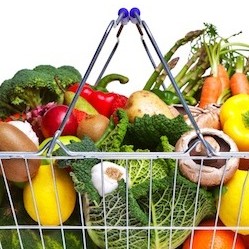We’ve all heard the expression, “You are what you eat.” A healthy diet is one of the pillars of good health. The right foods help every part of your body to work better. They can also make you feel better, and that makes you happier.
Food fuels your cells, organs, and every system in your body. But, it turns out the foods you eat also provide fuel for the trillions of bacteria and other microorganisms living in your digestive tract. They’re collectively known as your microbiome.
Just like the rest of your body, when your microbiome is well fed, it works better. And that makes you feel better. Eating certain foods can worsen symptoms like gas, bloating, or constipation. And following specific diet patterns can benefit (or harm) the microbes in your gut.
One of the most exciting things scientists have learned is that your microbiome changes quickly, depending on what you eat.
Foods to Choose or Avoid
Fortunately, there are no hard food rules to follow to feed your microbiome. Choose foods you like, make youfeel good, and are practical to prepare. That said, there are a few guidelines that are helpful to follow, and the key is consistency:
Focus on Plant Foods
There isn’t one best (or worst) food for your microbiome. Instead, researchers have found two things:
- Your gut bacteria love plant foods.
- The best way to encourage a healthy variety of bacteria in your gut is to eat a variety of plants.
What’s a plant food? Anything that grows in the ground and isn’t manufactured. That includes:
- Fruits and vegetables
- Nuts and seeds
- Legumes
- Whole grains
Try to choose plant foods that are as close to their natural form as possible and eat several servings each day.
Experiment with Prebiotic Fiber
Probiotics are live bacteria that have health benefits. Prebiotics are a source of food (or fertilizer) to help support probiotics. The bacteria in your GI tract need to eat, too, and they especially love to eat prebiotic fiber.
Most plant foods contain some prebiotic fiber, but it’s highest in foods like:
- Onions
- Leeks
- Garlic
- Asparagus
- Green (underripe) bananas
The problem with eating lots of prebiotic fiber is that sometimes it makes digestive symptoms like gas and bloating worse. It’s helpful to keep a food and symptom journal. Take note if certain foods seem to bother you. Small amounts might be OK, but larger portions at one time might be too much.
Choose Healthy Fats
Healthy, unsaturated fats from plants and cold-water fish help support a healthy inflammatory modulation in your gut and throughout your body. It’s helpful to eat a few servings several times a week.
Limit Processed Foods
A burger, pizza, or cookies are a treat occasionally. But unfortunately, they’re not the best choices for your microbiome. Quite a bit of research shows that a Western diet, full of highly processed, packaged, and fast foods is harmful to your microbiome. Ingredients like added sugar, white flour, refined oils, additives, and too many calories reduce bacterial diversity. (1) That’s linked to more frequent digestive problems.
Listen to Your Body
Start to experiment with your diet and see how it impacts your IBS symptoms. There might be healthy choices that don’t make you feel right. The important thing is to learn what they are so you can work around them while still nourishing your microbiome.
One way you can ease your digestive symptoms is to consistently take the right digestive support product. Depending on your needs, these might include digestive enzymes and a medical food for IBS, such as Ther-Biotic Pro™ IBS Relief†.
- Conlon MA, Bird AR. The impact of diet and lifestyle on gut microbiota and human health. Nutrients. 2014;7(1):17-44. Published 2014 Dec 24. doi:10.3390/nu7010017https://www.ncbi.nlm.nih.gov/pmc/articles/PMC4303825/






